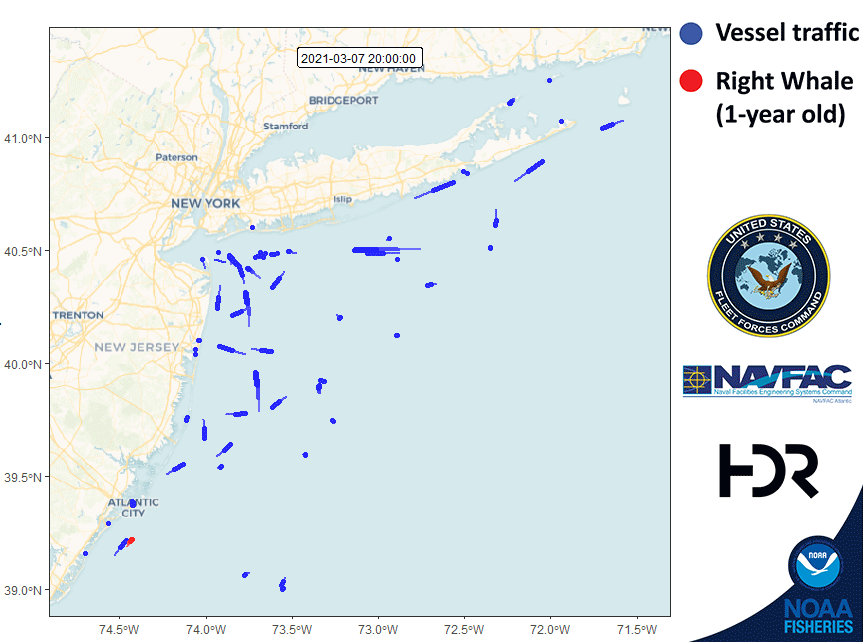Despite falling right whale numbers, criticism grows in NC over proposed boat speed rules
Memorial Day traditionally marks the unofficial start of summer, and for many in Southeastern North Carolina that means getting their boats ready for a fun season on the water.
But for local anglers and charter boat captains, the waters already have been choppy for several months and they fear could get worse if a proposed speed limit rule by federal regulators comes into effect later this year.
The National Oceanic and Atmospheric Administration (NOAA) wants to put the brakes on boats as small as 35 feet in near-shore waters to help one of the most endangered marine mammals in the world a fighting chance to survive.

There are only an estimated 336 North Atlantic right whales left, according to the latest estimate by the North Atlantic Right Whale Consortium, and their numbers are continue to fall due to a number of factors including climate change, which is driving their favorite food source − zooplankton − farther north into waters already heavily used by people, and entanglements with fishing gear.
'Misguided proposal'
But it is vessel strikes that are proving to be extra deadly for the whales, which swim close to shore and the surface in some of the busiest shipping channels in the world as they migrate along the East Coast from the Canadian Maritimes to Northern Florida. According to federal data, 12 of 36 documented North Atlantic right whales deaths between 2017 and 2023 were due to vessel strikes. That was the most deadly known cause.
The federal government has enforced seasonal 10-knot speeding limits on large vessels, 65 feet or over, around the entrances to busy deepwater ports − including Wilmington and Morehead City − for more than a decade. The new proposal would drop the boat size to 35 feet and increase the areas covered by the speed restrictions as well as their duration. Off the Tar Heel State, boaters operating in coastal waters between roughly Nags Head on the Outer Banks south through Wilmington and all the way to northern Georgia would face speed restrictions between November and mid- to late April.

Charter boat and fishing captains fear the proposals could decimate their business. Although not the height of the summer tourism season along the North Carolina coast, the spring and fall "shoulder" seasons still generate plenty of business from visiting fishermen for area boat captains, hotels, tackle shops and restaurants.
Since NOAA first floated the rules last summer, opposition has been growing among boaters and politicians to the government's proposal. Recently five state attorney generals, including Georgia and South Carolina, sent a letter to NOAA expressing concerns about impacts from the proposed regulations to their vital fishing and recreational boating industries and coastal economies.
U.S. Rep. David Rouzer, who represents Southeastern N.C. in Congress, also has expressed his opposition to the new rules.
"I have joined many other members of Congress asking NOAA to withdraw their misguided proposal restricting boat speeds, which will have far-reaching implications for Southeastern North Carolina’s local coastal communities, including commercial shipping, recreational fishing and boating, and towing vessels," the Wilmington Republican said in a statement. "The rule also jeopardizes the safety of boaters by forcing them to go slow in certain sea conditions that would increase the likelihood of dangerous accidents.”
Many coastal groups also have expressed concerns about the proposed speed rules. That list includes the N.C. Watermen United, a fishing advocacy group that's pushing for a two-year hiatus on any action to allow more time for research and discussion.
According to a report by the American Sportfishing Association released in May 2022, the recreational fishing industry in North Carolina supports 455,000 jobs and generates $152 in economic impact for every pound of fish landed.

Small price to pay
But biologists and environmentalists say something needs to be done if the right whale, which is a very slow breeder and saw its population decimated by whaling in the 19th century, is going to survive.
"Unless NOAA updates the Vessel Speed Rule, these coastal leaders will continue to see whales dying from boat strikes and washing up on their beaches," said Gib Brogan, campaign director for the marine environmental group Oceana. "We know that when ships slow down, we can save whales. Is that too much to ask to save a critically endangered species from extinction?”
Dr. Andrew Read is a marine biologist at Duke University and director of the school's marine lab in Beaufort. He said it's been an up-and-down time for right whales in recent months. Although 12 calves were born this winter, though one died soon after birth in Morehead City in January, four whales were observed entangled in fishing gear, and one whale washed ashore in Virginia Beach in February after being struck by a vessel.
"So there is still a lot of urgency to reducing mortality, from both ship strikes and entanglement," he said.
MOREWhale deaths in NC and along the East Coast have officials searching for answers

Dr. Robert Schick, also a marine biologist at Duke University, said some new detection equipment is showing the potential to offer mariners faster and better information about where the whales are and hopefully give them time to avoid the marine mammals.
"Even with the promise of better near real-time detection, the species is declining," he said. "Two of the biggest threats are strikes and entanglements, so it’s hard to envision not taking more drastic steps to mitigate these impacts."
Katie Wagner, a spokesperson with NOAA Fisheries, said the agency is still reviewing public comments and anticipates taking final action on the proposed rule later this year.
Reporter Gareth McGrath can be reached at GMcGrath@Gannett.com or @GarethMcGrathSN on Twitter. This story was produced with financial support from 1Earth Fund and the Prentice Foundation. The USA TODAY Network maintains full editorial control of the work.